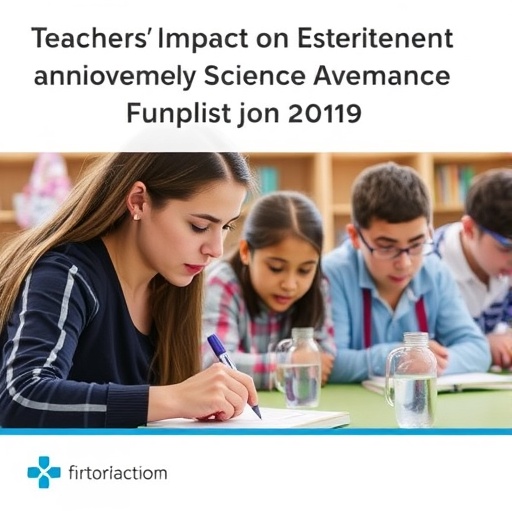In a significant exploration of educational practices, a recent study delves into the intricate relationship between teachers’ cognitive activation practices, their characteristics, and student achievements in the realm of science education. Conducted as part of the Trends in International Mathematics and Science Study (TIMSS) 2019 in Sweden, this research sheds light on how different teaching methodologies can influence students’ grasp of science subdomains. The researchers—Yourdshahi, Yang Hansen, and Borger—aim to offer insights that could shape future pedagogical approaches and elevate educational standards.
At the heart of this study lies the concept of cognitive activation, a pedagogical practice where educators stimulate students’ thinking and understanding through purposeful questioning and interactive discussion. The research posits that varying levels of cognitive activation can lead to different academic outcomes among students. This premise sets the stage for examining how teachers who engage students actively can better facilitate learning and foster higher achievement in science.
Sweden, known for its progressive educational policies, provides a fertile ground for such a study. The TIMSS 2019 assessment evaluated the performance of students across various countries in mathematics and science, with a particular focus on grasping complex concepts rather than mere rote memorization. In this context, the Swedish educational system’s characteristic emphasis on critical thinking and problem-solving makes it an ideal subject for analyzing the link between teaching practices and student performance.
The findings illustrate that teachers who excel in cognitive activation not only possess robust subject matter knowledge but also cultivate an engaging learning environment. These educators employ techniques that encourage students to articulate their thinking, collaborate with peers, and explore scientific concepts deeply. The evidence suggests that such teaching practices significantly correlate with improved student performance in science, further stressing the importance of teacher quality in educational outcomes.
Moreover, the research identifies personality traits and characteristics of effective science teachers that contribute to cognitive activation practices. Teachers who are reflective, adaptive, and possess high emotional intelligence are more likely to implement strategies that promote active learning. These characteristics enable them to better assess and respond to the diverse needs of their students, tailoring their methods to enhance understanding and engagement.
The implications of these findings extend beyond individual classrooms. Educational policymakers and administrators can glean valuable insights into teacher training and professional development. By prioritizing cognitive activation within teacher education programs, institutions can better prepare future educators to facilitate student learning in meaningful ways. This emphasis could reshape how science is taught, potentially leading to higher achievement levels across the board.
One cannot overlook the potential challenges in assessing cognitive activation practices. The study acknowledges that measuring such dynamic and nuanced teaching techniques is complex. However, utilizing structured observational tools and student feedback can provide meaningful data. These methods not only highlight effective practices but also pave the way for continuous improvement in teaching strategies.
As the findings resonate throughout the academic community, an ongoing dialogue about the best teaching practices for enhancing student learning is prompted. This discourse encourages educators to share their experiences and adapt successful strategies that promote active engagement in science education. By fostering a community of practice that values cognitive activation, schools can become incubators for innovative pedagogical developments.
In the broader context of education, the study underscores the necessity of a holistic approach in evaluating teaching effectiveness. While standardized test scores are important, they should not be the sole measure of a teacher’s impact. Emphasizing the quality of interactions in the classroom, particularly those that stimulate cognitive engagement, presents a more comprehensive evaluation framework for educational success.
This research aligns with global educational trends that recognize the importance of critical thinking and problem-solving as fundamental skills in the 21st century. As nations contend with rapid technological advances and shifting job markets, equipping students with strong foundational knowledge in science—coupled with the ability to think critically—has never been more vital. This study provides a roadmap for achieving that goal through effective teaching practices.
In conclusion, the relationship unveiled by Yourdshahi, Yang Hansen, and Borger between cognitive activation practices, teacher characteristics, and student achievement in science is a call to action for educators and policymakers alike. By embracing this knowledge and fostering an environment where cognitive activation is prioritized, the potential to enhance student learning outcomes in science education is decidedly within reach.
As educators reflect on their practices and consider the influence of their teaching styles, it is clear that the path to improved student achievement is paved with thoughtful engagement and deliberate cognitive activation. The future of science education rests on the shoulders of dedicated teachers who are willing to adapt, innovate, and inspire.
By meticulously analyzing these dynamics within the classroom, the research exemplifies a growing understanding of how effective teaching can transform student learning. The change begins with educators willing to engage deeply with their student populations and harness the transformative power of cognitive activation.
Ultimately, this study not only contributes valuable insights to science education but also serves as a reminder of the profound impact that skilled educators can have on the academic trajectories of their students.
Subject of Research: Teachers’ cognitive activation practices, teacher characteristics, and student achievement in science education.
Article Title: Relationship between teachers’ cognitive activation practices, teacher characteristics and student achievement in science subdomains: a study of TIMSS 2019 in Sweden.
Article References:
Yourdshahi, Z.H., Yang Hansen, K. & Borger, L. Relationship between teachers’ cognitive activation practices, teacher characteristics and student achievement in science subdomains: a study of TIMSS 2019 in Sweden. Large-scale Assess Educ 13, 18 (2025). https://doi.org/10.1186/s40536-025-00252-z
Image Credits: AI Generated
DOI:
Keywords: Cognitive activation, teacher characteristics, student achievement, TIMSS 2019, science education.




